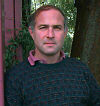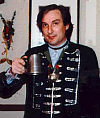'The Review' - Through A Historian's Eye
After Jack Rakove (rakove@leland.stanford.edu) received word that he had just been awarded the Pulitzer Prize, he marked the event by buying a white chocolate chip cookie to finish off his lunch. At least, that's the way the San Francisco Chronicle headlined the news. Sic transit gloria media. Minutes before, Rakove, tenured professor of history at Stanford University, had learned he had won the 1997 Pulitzer Prize for his book "Original Meanings: Politics and Ideas in the Making of the Constitution."
Jack Rakove
Last fall I felt our readers would benefit greatly if they were able to examine the mind and heart of this articulate—and now-renowned—historian. To get the ball rolling I called on Steve Munzel, a regular participant in our Town Crier forums. He knew Dr. Rakove and promised to make contact re our request for an interview. Soon after Steve announced that, yes, Dr. Rakove, had consented to make time available. Needless to say, the conversation that ensued, conducted in a Q-and-A format, turned out to be a fascinating and brilliant examination of a number of issues, both historical and contemporary.
It should be noted that Steve Munzel's vita acknowledges that he is an educator, historian, consultant and free-lance writer. A self-described "small-town politician," he lives with his wife and daughters in California's Santa Clara Valley.
Adamiak's article, replete with maps of the battlefields of operations, is based on a longer research paper completed at Penn State entitled "That the Country May Not Merely Be Overrun But Destroyed: the 1779 Sullivan Campaign." Adamiak was awarded the Barnes Fellowship for research in Colonial American History, and is a member of the Society for Military History, Society for Historians of the Early Republic and the Civil War Roundtable of the Ozarks. He is a frequent contributor to historical and military journals. You can email him at: (sja794f@nic.smsu.edu).
Dr. Henretta is Priscilla Alden Burke Professor of American History at the University of Maryland, College Park. His email is: (jh53@umail.edu).

George Bray
Scalping, as evidenced during the French and Indian War, was not so much a scienceas it was an art. At least, that's my impression after reading George Bray's painstakingly detailed article on this rather arcane subject. (WARNING: This story contains material that may be too descriptive for young, impressionable minds!) While Mr. Bray's pictures of the whys and wherefores of scalping may not be for the squeamish, all that he describes is grounded in historical fact. As such, he provides us with a great service, I think, in adding to the archives a subject that is notably absent both in detail and content.I never knew, for instance, that many who were scalped actually survived to describe this horrific event. I also learned from Mr. Bray's article that one scalp oftentimes yielded four separate scalps. The answers to these seeming contradictions can be found in "Scalping During the French and Indian War" in this issue of The Review. Mr. Bray-- historian, author, re-enactor-- is a Fellow in the Company of Military Historians and lectures widely throughout the country. Contact him at: (george@frontiernet.net).

George L. Marshall, Jr.
Author George L. Marshall, Jr. adds to the lore of mid-18th century America with an incisive profile of Mohawk Chief Joseph Brant. Mr. Marshall's account of this illustrious figure is more than a profile; he presents us with the background surrounding Brant in a way that allows us to better understand this influential, often enigmatic personality. I have no doubt you will enjoy his colorful, informative account "Joseph Brant-Mohawk Chief, Loyalist, Freemason."George Marshall (glmarshalljr@worldnet.att.net) serves as an adjunct faculty member of John C. Calhoun College in Huntsville, Alabama, while employed as a research physicist at the U.S. Army Missile Command, Redstone, Alabama. Colonial American history is among Mr. Marshall's special areas of interest. His historical articles have been published often in national journals.
Popular Cities
Popular Subjects
Mongolian Tutors
High German Tutors
UK A Level Irish Tutors
Reading Tutors
Islamic Studies Tutors
AP Economics Tutors
Texas History Tutors
PRAXIS Tutors
Spanish Tutors
RD - Registered Dietician Exam Tutors
USMLE Tutors
Algebra 2 Tutors
Florida EOC Assessment Tutors
Human Physiology Tutors
CPA Tutors
10th Grade English Tutors
UK GCSE Psychology Tutors
US Geography Tutors
Art Education Tutors
CUDA Tutors
Popular Test Prep
GMAT Courses & Classes
PSAT Courses & Classes
CLEP College Composition Test Prep
CLEP American Government Courses & Classes
OAE - Ohio Assessments for Educators Courses & Classes
CLS - Clinical Laboratory Science Test Prep
GATE/ TAG Courses & Classes
OAT Physics Test Prep
SAT Subject Test in Chinese with Listening Courses & Classes
Series 31 Courses & Classes
